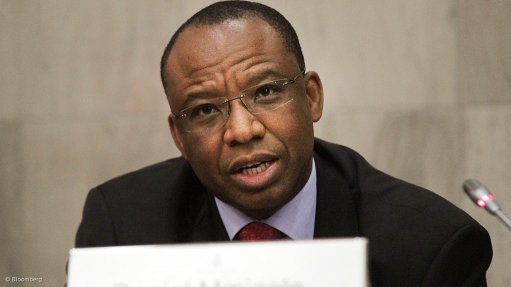
Presidential Climate Finance Task Team head Daniel Mminele
Photo by: Bloomberg
Some of the critical projects to be implemented over the short term under the Just Energy Transition Partnership (JETP) between South Africa and various other countries, including the US and the UK, may start before the next United Nations (UN) Climate Change conference, or COP27, early in November, confirmed Presidential Climate Finance Task Team (PCFTT) head Daniel Mminele on June 22.
He hosted a media briefing alongside the UK’s COP26 envoy and International Partners Group chairperson John Murton to update stakeholders on where the JETP stands.
Mminele explained that the country may see projects being confirmed and initiated before the end of the year, given the urgency around South Africa’s energy security.
One such project may be Eskom’s Just Energy Transition (JET) project at the Komati power station, in Mpumalanga, which will likely be presented to the World Bank for approval before COP27.
Eskom plans on repurposing and repowering the Komati power station, as part of its pipeline of 15 JET projects.
The partners are in the process of establishing governance and implementation structures for the partnership, including the appointment of an independent secretariat and establishing working groups to focus on the electricity, green hydrogen and transport sectors, alongside secondary working groups dealing with finance and implementation.
The primary sectors were identified as priorities during the establishment of JETP – a political declaration issued at the COP26 climate change conference held in Glasgow, Scotland, in November 2021.
Through this declaration, the UK, the European Union, France, Germany and the US, committed to mobilise an initial $8.5-billion over the next three to five years to support the achievement of South Africa’s Nationally Determined Contribution (NDC).
The NDC is South Africa’s commitment in terms of the UN Framework Convention on Climate Change and the Paris Agreement to contribute to the global climate change effort. South Africa has committed to keep national greenhouse gas emissions at between 398 and 440 megatons of carbon dioxide equivalent by 2030.
Murton believed the JETP to be a ground-breaking, first-of-its-kind agreement in terms of climate financing, and helping a country transition to a low-carbon and climate-resilient economy.
The PCFTT is developing a comprehensive investment plan for what is required to achieve a just transition in South Africa. The task force, in collaboration with its international partners, is also finalising a funding package that meets the country’s investment needs and aligns with its fiscal framework.
The investment plan is targeted for finalisation by October.
The partners recognise that the financing package needs to be properly structured to support South Africa’s priorities, and reflect the country’s unique needs and fiscal challenges. It also needs to incorporate appropriate risk-sharing initiatives, including that terms of loan finance should be more attractive than what South Africa could normally secure in the capital markets.
Mminele pointed out that the exact cost of the overall energy transition is difficult to determine, since the transition spans over multiple decades. He did confirm that the funds raised will be deployed in a catalytic manner, to ensure that more investment can be crowded in from private capital markets.
COP president Alok Sharma and a delegation of Ministers from the South African government, including Mondli Gungubele, Dr Naledi Pandor; Enoch Godongwana, Barbara Creecy, Pravin Gordhan, Gwede Mantashe and Ebrahim Patel met on June 21 to discuss an indicative work plan and timetable for the JETP.
Murton concurred that the funding package for the JETP needs to be catalytic, stimulating new donors coming on board, and coherent. He added that the UK will provide South Africa with a further £1.5-million from Britain’s Partnering for Accelerated Climate Transitions Programme, apart from the JETP.
These funds will be used to provide technical assistance to the relevant South African government entities concerned with energy sector decarbonisation, just transition job resilience and climate transition pathways, to achieve net-zero carbon emissions in various sectors of the country’s economy.
Meanwhile, the JETP continues to investigate creating partnerships with other countries.